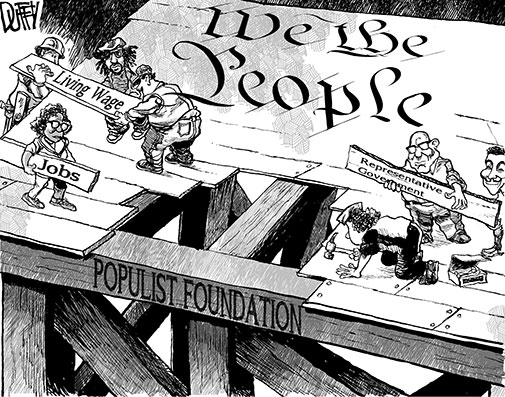The Rise of Populism

February 26, 2018
One of the most defining political movements of our time is the rise of a political belief system known as Populism, which has in the past few years swept much of the Western World. This philosophy has been brought to attention by noteworthy occurrences such as Brexit in the UK, and the election of Donald Trump in the US. Despite new successes by the supporters of this movement, there has been significant opposition to Populist tendencies throughout our nation.
Populism is typically defined, roughly at least, as an opposition of the common people against elitist institutions, classes, and governments. With a long history dating back thousands of years and firmly rooted in many human instincts, populism has arguably had many historical examples, which range from the Civil Rights Protests of the 1960s to workers Unions, depending on how you define the movement, with examples now including Nationalists, and controversial political figures like Donald Trump. The Election of 2016 especially has arguably expanded the appeal of Populist politics to a wider American audience than previously thought possible. Recent events have now thrust the philosophy of Populism back into the main street of political and societal debate, and has been a flashpoint for heated disagreements.
So is Populism truly a worthy struggle by the common people against out of touch elites and systems of government? Or is it a darker way to attempt to divide people into different groups on the basis of their varying identities, as many critics of the movement have claimed.
My personal belief on the subject of Populism is generally positive. Overall, I believe that the average men and women of this country and any nation should have the most control in the running of their country, since they are the people who will either benefit or suffer the most based on the direction the United States goes in. History has further shown us that people have a natural tendency to take advantage of others and to force their opinions on others, often against their will. Therefore, it is only natural that steps would be taken to make sure that the whole of society benefits.
One major issue that has caused Populism to gain so much support worldwide in the past few years was the belief that too much economic, societal, and political power has come to rest in the hand of a small, elite class of individuals. Data has shown that in the past 25 years, the average wages of Americans have barely risen, despite the comparatively rapid growth of foreign economies like China and India, whose treatment of workers has been described as near-slavery like conditions. In fact, many jobs once held by Americans now reside in these developing nations.
Other factors that have created what I believe to be justifiable concern range from the damage created by the Opioid Crisis to the rampant corruption that continues to be seen in our political system. Politicians from both parties routinely benefit from millions and millions of dollars from large corporations and special interests, while ignoring problems of drug abuse, crime, and poor infrastructure within our own nation, which each year claim thousands of American lives, weaken communities and decrease the power of the US on the global stage.
To be sure, that is not to say that all Populist movements are a positive force. Many do unfortunately take inspiration from beliefs that are heavily ethnocentric, and which tend to create a “Us vs. Them” mentality in relation to everyone who is perceived as being outside of certain classes of society. The dire effects of this type of thinking are now remembered as some of the darkest chapters of human society, leading to ethnic and political cleansings of disadvantaged people from Germany, the Soviet Union, China, and many more. I believe, however, that there is potential within this movement to create a more equitable society, and that the vast majority of individuals who identify as Populists are not hateful individuals. Part of the appeal of this ideology is that it has shown its ability to appeal to people of all races, religions, and political philosophies. The supporters of Donald Trump and Bernie Sanders for example, although disagreeing on many economic issues and coming from different backgrounds, can still find common ground over their distrust of established political institutions, which they believe put profits above the good of the country.
There is nothing inherently sinister about wanting the best possible conditions for one’s communities, families, and nations. The founders of our nation understood that the only way to maintain a democratic society was to make a government truly one of the American people, neither bought nor sold by a professional class of politicians and corporations that campaign repeatedly for public office on promises of placing their constituents first, only to forget or ignore these issues upon being elected. Since the establishment of our nation, our guiding principles have allowed us to progress to a point where all Americans are guaranteed the ability to vote, worship, hold office, and speak their mind as they please. One sure way to maintain this process is to continue our long-valued democratic traditions of being a nation based on the idea that all should have their voices count in society.

